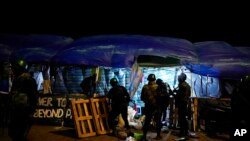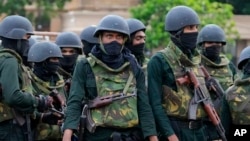Sri Lankan troops have dismantled the main protest site in Colombo, headquarters for demonstrators who had led a monthslong anti-government campaign. The move is seen as a signal that newly elected President Ranil Wickremesinghe will crack down on campaigners who forced the ouster of his predecessor.
Hundreds of troops and police commandos armed with assault rifles and batons gathered outside the presidential office in the early hours of Friday evicting protesters, tearing down their tents and removing banners outside the main entrance to the president’s office.
The police action came a day after Wickremesinghe, whom demonstrators also oppose, was sworn into office.
Shabeer Mohamed, a freelance journalist, told VOA that when he went to the site around 1:30 a.m., he was prevented from entering.
“All the entrances were blocked by soldiers. One soldier hit me on my back and threw down my phone. They removed the tents,” he said.
The BBC reports that one of its journalists was beaten during the raid and that security forces deleted video from his phone.
Police called Friday’s action a "special operation" to clear protesters and take control of the presidential secretariat. Nine people were arrested, and several were reported to be injured.
Several people were reported to have been arrested during the raid while several sustained injuries.
Condemning the action, the Bar Association of Sri Lanka said in a statement that the use of armed forces to suppress civilian protests on the president’s first day in office “will have serious consequences on the country’s social, economic and political stability.” The association said that two lawyers who went to the site were assaulted.
Sri Lanka has witnessed months of unrest over an economic crisis that has virtually bankrupted the country and led to severe fuel, food and medicine shortages and runaway inflation, causing huge hardships. Many blame the crisis on mismanagement by the previous government.
The main opposition leader, Sajith Premadasa called the predawn raid a “cowardly assault on peaceful protesters.” In a tweet he said it was “A useless display of ego and brute force putting innocent lives at risk & endangers Sri Lanka’s international image at a critical time.”
Protesters who had earlier announced that they would hand back the site they were occupying on Friday afternoon said they were taken aback by the action.
“It’s brutal, its despicable, it is cowardly,” said Chameera Dedduwage, one of the protesters. “We had already said yesterday that we would vacate the site, but I guess the new president needed to demonstrate his power.”
Wickremesinghe had imposed an emergency on Monday, when he was acting president, raising fears among demonstrators of a crackdown.
After he was elected as president on Wednesday, he warned against any attempt to occupy government buildings, saying legal action will be taken against those who engage in illegal acts.
He also said that “we must allow those who engage in peaceful dissent to do so.”
Western envoys in Colombo and the United Nations urged restraint after Friday’s raid. Expressing concern about the use of force, Hanaa Singer-Hamdy, the U.N. resident coordinator to Sri Lanka, tweeted, “Actions that stifle protests and the right to peaceful assembly can worsen economic and political instability in Sri Lanka.”
U.S. ambassador in Colombo, Julie Chung, said she was "deeply concerned" about the action against the protesters in the middle of the night. "We urge restraint by authorities and immediate access to medical attention for those injured."
The protest movement had forced the resignation of President Gotabaya Rajapaksa and his family members who occupied top positions in the previous government, holding them responsible for the country’s economic crisis. Rajapaksa has fled the country.
While the movement has been largely peaceful, two weeks ago, protesters stormed and occupied several key government buildings, including the homes and offices of the president and prime minister. A mob had also burned down Wickremesinghe’s private residence. Days later, the demonstrators vacated the buildings, but they continued camping outside the president’s office, as they had been for months.
Wickremesinghe’s election to the top job by lawmakers has disappointed those who see him as close to the Rajapaksas and a representative of the same political establishment they have campaigned to remove from power. Even before he took office protesters had raised chants of “Ranil, Go Home.”
Wickremesinghe appointed Dinesh Gunawardena as the new prime minister on Friday who is also known as an ally of the Rajapaksa family.





